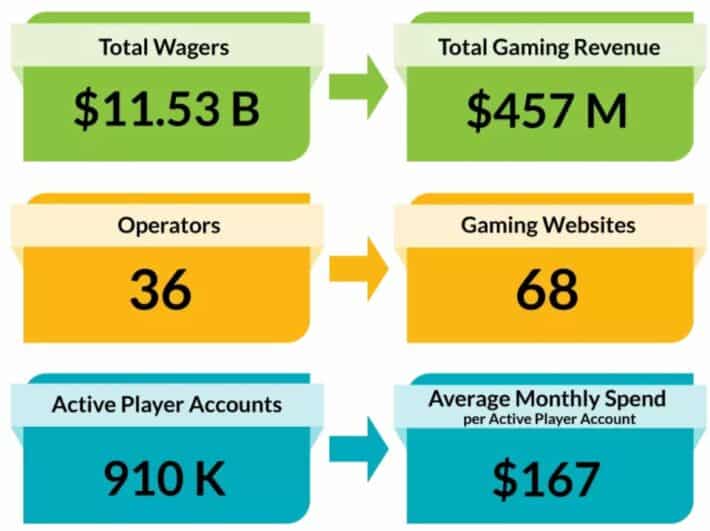
Gamblers in Ontario wagered $11.53 billion and the market produced $457 million in total gaming revenue — from iCasino, online sports betting, and online poker — for the period of Oct. 1-Dec. 31, 2022, according to the Fiscal Year Q3 report released by iGaming Ontario on Thursday.
The $11.53 billion in total handle does not include promotional wagers, and the total gaming revenue of $457 million includes rake fees, tournament fees, and other fees across 36 total operators and 68 active gaming websites.
Regulators are also reporting that there were 910,000 active player accounts over the three-month period with an average monthly spend of $167 per user.

The total wagers of $11.53 billion represents a 91% increase over the Q2 period, which ran from July 1-Sept. 30, and the total gaming revenue of $457 million shows a 71% increase over Q2. While the number of operators also increased from 24 operators in Q2 to 36 in Q3, and the total number of gaming websites rose from 42 websites in the second quarter to 68 in the third quarter.
The market also added 282,000 more player accounts since the second quarter and the average monthly spend per active player account has increased by $25.
It’s important to note that these figures don’t include iGaming revenue from the Ontario Lottery and Gaming Corporation, which offers its own iCasino and retail and online sports betting platform. PROLINE + was the first online sportsbook to launch in Ontario, shortly after Canada decriminalized single-event wagering on Aug. 27, 2021.
Since the launch of the market last April, Ontarians have wagered $21.64 billion and the market has produced $886 million in total gaming revenue.
Why the market exploded in Q3
The dramatic rise in the Q3 revenue numbers was predicted by industry stakeholders late last year. They said the convergence of all of the major sports leagues (NHL, NBA, NFL, MLB playoffs), when combined with the added betting interest in the FIFA World Cup, would help bolster handle and total gaming revenue in the quarter.
The implementation of a hard deadline for grey market operators to join Ontario’s online market by regulators last Halloween also resulted in the addition of many new operators, and thus a huge boost in revenue, in the third quarter.
Private operators continued to roll out aggressive marketing tactics in the third quarter, especially during the World Cup in December, which isn’t sitting well with consumers.
Regulators have instituted an annual tax rate of roughly 20% on private operators, which makes Ontario attractive to online gambling operators.
Unfortunately, iGaming Ontario does not break down handle and revenue by category, so it’s unclear how much of the handle and total gaming revenue in the third quarter was generated specifically by sports betting alone.
We also don’t have any data on which private operators are dominating the market. It’s a common practice in the United States to divulge these numbers, but it hasn’t been adopted by Ontario, yet.
Operators such as Pinnacle and bet365, among others, had previously been taking bets in Ontario for many years prior to the launch of the new regulated online market last April. It’s expected that those operators have retained a significant market share since joining the regulated market.
A study conducted by Canada Sports Betting last July suggested that the majority of Ontario bettors have been placing wagers with bet365, 888, and BetMGM. These bettors also had a preference to wager on the big four professional sports leagues (NHL, NFL, NBA, MLB).